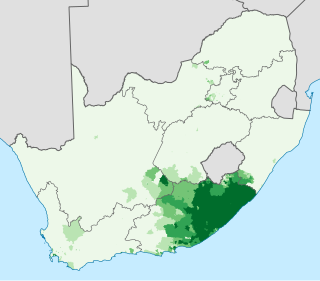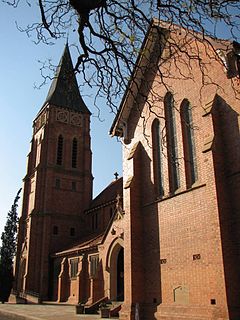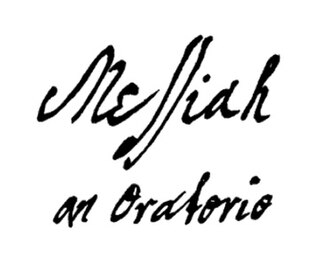The Diocese of Kimberley and Kuruman is a diocese in the Anglican Church of Southern Africa, and encompasses the area around Kimberley and Kuruman and overlaps the Northern Cape Province and North West Province of South Africa. It is presided over by the Bishop of Kimberley and Kuruman, currently Ossie Swartz. The seat of the Bishop of Kimberley and Kuruman is at St Cyprian's Cathedral, Kimberley. There have so far been 12 bishops of the See, though one of these served for two different periods of time.
Wilfrid Gore Browne was an Anglican bishop, the first Bishop of Kimberley and Kuruman from 1912 to 1928. He was described as a saintly bishop with "a keen sense of humour" and "a winning courtesy."
Oswald Peter Patrick Swartz is a South African Anglican bishop. He is the twelfth and current Bishop of Kimberley and Kuruman.
William Thomas Gaul (1850–1927) was Rector of All Saints Church, Du Toit's Pan, Kimberley, afterwards of St Cyprian's Church, Kimberley, Rural Dean of Griqualand West, and Archdeacon in what was still the Diocese of Bloemfontein, before being elected the second Bishop of Mashonaland, where he styled himself "the smallest bishop with the largest diocese in Christendom." He officiated at the funeral of Cecil John Rhodes and helped draft the Rhodes Trust Deed.
Allan Becher Webb was the second Bishop of Bloemfontein, afterward Bishop of Grahamstown and, later, Dean of Salisbury.
The Very Revd Thomas Claude Robson was the first Anglican Dean of Kimberley, and Rector of St Cyprian's Cathedral, Kimberley, South Africa.
The Reverend Canon Robin Roy Snyman is a priest in the Anglican Church of Southern Africa, who served as Dean of Kimberley and rector of St Cyprian’s Cathedral, and afterwards was Vice-Provost at the Cathedral Church of St Mary the Virgin, Port Elizabeth. He was born at Waterval Boven, in what is now Mpumalanga in 1934.
The Very Revd John Ranulph Vincent was Dean of Bloemfontein, in South Africa, from 1892; and afterwards of Grahamstown, 1912–1914.
Arthur Henry Attwell was Bishop of Sodor and Man from 1983 to 1988. He served as Dean of Kimberley, South Africa, from 1953 to 1959 and afterwards as Rector of Workington, Cumberland.
Justus Mauritius Marcus was Regional Bishop of Saldanha Bay in the Diocese of Cape Town, 2002 to 2003, having served as Dean of Kimberley and Rector of St Cyprian's Cathedral from 1992 to 2002. He died from cancer, aged 48, on 1 December 2003. Marcus was predeceased by his first wife, Milly. His second wife and widow is Sarah Rowland Jones, a fellow priest who then fulfilled a research ministry in the Anglican Church of Southern Africa at the behest of two successive Archbishops of Cape Town before returning to Wales in late 2013.
Brian Victor Beck, an Anglican priest in South Africa, served as Dean of Kimberley from 2003 to 2010. He is an Honorary Canon of St Cyprian's Cathedral.
Alan John Butler, a Director of the Kuruman Moffat Mission in Kuruman, South Africa, and Canon of Kimberley Cathedral, was a priest who served in the Diocese of Kimberley and Kuruman for a major part of the second half of the twentieth century. He was responsible for the restoration of the historic Moffat Mission precinct which became renowned as a conservation area and as a beacon of hope in the troubled last years of Apartheid. He was born in the United Kingdom in 1930 and died at Wimborne on 13 January 2011.
Simon Mark Aiken is Dean of Benoni and rector of St Dunstan's Cathedral in the Diocese of the Highveld. He was previously the 12th Dean of Kimberley and rector of St Cyprian's Cathedral, Kimberley, in the Diocese of Kimberley and Kuruman in South Africa. Born in England in 1962, he went to South Africa in 2006, initially as subdean at Bloemfontein Cathedral.
Mphashane Reginald Leeuw is the 13th Dean of Kimberley and Rector of St Cyprian's Cathedral, Kimberley, in the Diocese of Kimberley and Kuruman in South Africa. Leeuw was born in Barkly West, Northern Cape, and served in several parishes in the diocese prior to his appointment as Dean.
Andrew John Hunter has been Dean of Grahamstown since 2008: he is also Archdeacon of Grahamstown.
Wilfrid Lloyd Wellington was an Anglican priest in South Africa in the 20th century, most notably the last Dean of St Saviour's Cathedral, Pietermaritzburg.













